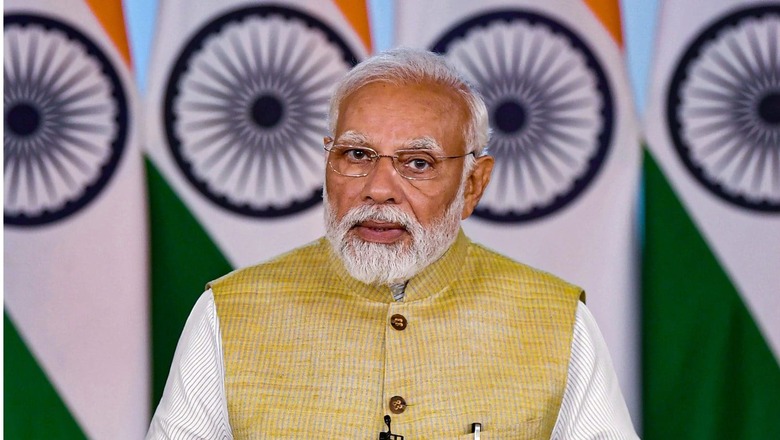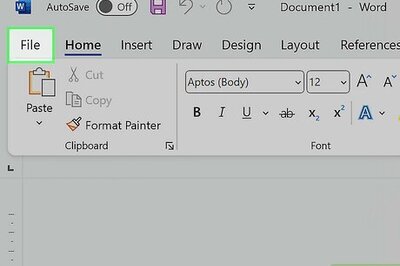
views
Prime Minister Narendra Modi on Tuesday expressed hope that digital transactions will soon surpass cash with Unified Payments Interface (UPI) increasingly becoming the most preferred payment mechanism in the country.
Modi after the launch of the cross-border connectivity between the UPI and PayNow of Singapore said about 74 billion transactions amounting to more than Rs 126 trillion, which is approximately 2 trillion Singapore dollar, was done through UPI in 2022.
“Many experts are estimating that very soon India’s digital wallet transactions are going to overtake cash transactions,” he said.
A large number of transactions via UPI demonstrate that this indigenously designed payment system is very secure, he said.
Modi along with his Singaporean counterpart Lee Hsien Loong witnessed the launch of cross-border connectivity between UPI and PayNow via video conferencing.
The facility was launched through token transactions by Reserve Bank of India Governor Shaktikanta Das and Managing Director of Monetary Authority of Singapore Ravi Menon using the UPI-PayNow linkage.
Modi in a tweet said, “Today is a special day for India-Singapore friendship and for our efforts to deepen collaboration in FinTech and innovation. The participation of my friend, PM @leehsienloong made this morning’s programme even more special.” Prime Minister Lee said the idea of linking PayNow and UPI was first conceived in 2018, when Modi visited Singapore.
“Since then, our two central banks have been working on this in earnest. Digital connectivity was also a key topic discussed at the inaugural India-Singapore Ministerial Roundtable (ISMR), which was held in New Delhi last September. So I am very glad that the PayNow-UPI linkage has now become a reality,” Lee explained.
“As we progressively add more users and use cases, the PayNow-UPI linkage will grow in utility, and contribute more to facilitating our trade and our people-to-people links,” Lee said.
Cross-border retail payments and remittances between Singapore and India amount to over USD 1 billion annually.
“I hope this strong partnership between Singapore and India will continue to spawn innovative technology solutions and create more cross-border opportunities for our digital economies,” Lee said.
Stressing that the linkage of UPI and PayNow is a new milestone in India-Singapore relations, Modi said, this will help people of both the countries to do cross-border transactions through mobile phone in an affordable manner.
Singapore is the first country with which cross-border Person-to-Person (P2P) payment facility has been launched, he said, adding, this will help the Indian diaspora in Singapore, especially migrant workers/students and bring the benefits of digitalisation and fintech to the common man through instantaneous and low-cost transfer of money from Singapore to India and vice-versa.
Pointing out that the focus of the government is to promote innovation and modernisation, Modi said the Digital India programme of the government has enhanced ‘Ease of Living’ and ‘Ease of Doing Business’ and digital connectivity and has pushed financial inclusion.
The Digital India programme has brought in significant reforms in governance and public service delivery.
The linkage will enable users of the two fast payment systems in either country to make convenient, safe, instant, and cost-effective cross-border fund transfers using their respective mobile apps.
Funds held in bank accounts or e-wallets can be transferred to or from India using just the UPI-id, mobile number, or Virtual Payment Address (VPA), the Reserve Bank of India (RBI) said in a statement.
To begin with, the statement said State Bank of India, Indian Overseas Bank, Indian Bank and ICICI Bank will facilitate both inward and outward remittances, while Axis Bank and DBS India will facilitate inward remittances.
For Singapore users, the service will be made available through DBS-Singapore and Liquid Group (a non-bank financial institution). More banks will be included in the linkage over time.
Customers of the above participating banks can undertake cross-border remittances to Singapore using the bank’s mobile banking app or internet banking.
To begin with, an Indian user can remit up to Rs 60,000 in a day (equivalent to around SGD 1,000). At the time of making the transaction, the system shall dynamically calculate and display the amount in both currencies for the convenience of the user, it said.
The UPI-PayNow linkage is the product of extensive collaboration between the RBI, Monetary Authority of Singapore (MAS), and Payment System Operators of both countries viz. NPCI International Payments Limited (NIPL) and Banking Computer Services Pte Ltd (BCS), and participating banks / non-bank financial institutions.
This interlinkage aligns with the G20’s financial inclusion priorities of driving faster, cheaper and more transparent cross-border payments and will be a significant milestone in the development of infrastructure for cross-border payments between India and Singapore, the statement said.
India has emerged as one of the fastest-growing ecosystems for fintech innovation. A key emphasis of the Prime Minister has been on ensuring that the benefits of UPI are not limited to India only but extend to other countries as well.
The virtual launch was preceded by a phone call between the two Prime Ministers, wherein discussions were held on areas of mutual interest. Prime Minister Modi thanked Prime Minister Lee for his partnership in taking the India-Singapore relationship forward and looked forward to working with him under India’s G20 Presidency.
“As the world becomes increasingly globalised and interconnected, we believe in collectively harnessing technology to expand access to fast and seamless cross-border payment services,” DBS Bank Singapore Country Head Shee Tse Koon said.
With India being one of DBS’ biggest markets for overseas remittances, this is a welcome addition to our wide-ranging suite of payment solutions for SMEs, retail customers and especially migrant workers, who now have another convenient option to send money to their loved ones back home, Shee said.
Read all the Latest India News here

















Comments
0 comment